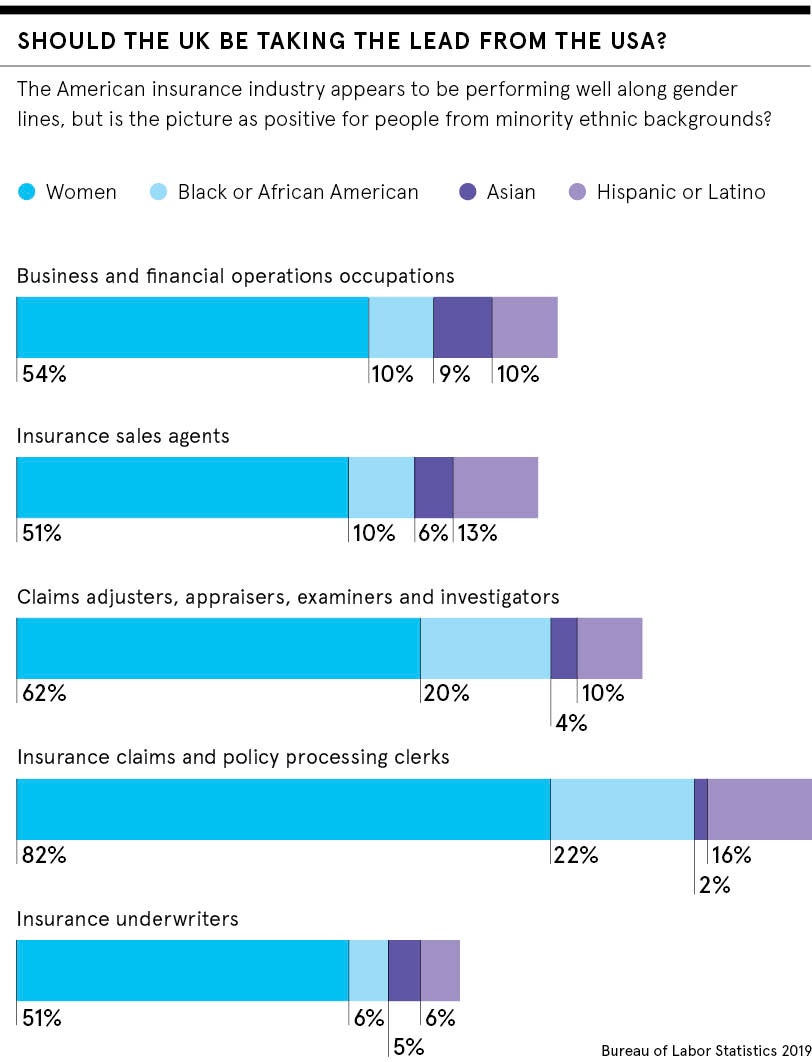
The insurance sector has long lagged behind on diversity and inclusion (D&I) and historically has been seen by many as inaccessible. But as coronavirus has signalled an end to the physical office space, at least for the time being, it’s clear there’s only so long the “old boys’ club” can survive.
Could remote working now provide a new opportunity to drive D&I in the insurance sector? And what can business leaders do to make it happen?
Changing the tide for gender diversity
When allegations of harassment and bullying at Lloyd’s of London surfaced last year, the organisation became the centre of a media storm. A survey conducted by the Banking Standards Board on behalf of Lloyd’s found the “experience of women is much less positive than it is for men”.
Out of the 480 people who had responded to its survey, 8 per cent said they had either encountered sexual harassment themselves or witnessed it. Lloyd’s of London chief executive John Neal said he was both “disappointed and upset” by the findings and vowed to enforce diversity quotas to have 30 per cent of top roles taken by women.
The situation highlighted long-standing problems within the sector as a whole. But Susan Vinnicombe, professor of women and leadership at Cranfield University, says while Lloyd’s of London has shone a spotlight on harassment in the insurance sector, discrimination tends to be a far bigger issue.
“The overarching problem is largely one of bias. Change is slowly taking place, but when you’ve only ever been used to seeing the same types of characters, unfortunately this can lead to others behaving differently towards them and making assumptions,” she says.

Focusing on results, not just hours worked
Vinnicombe adds that these problems have been exacerbated by the industry’s particular attachment to traditional working patterns. Rather than paying attention to specific results, employees were expected to be in the office, with progression and pay rises awarded to those who were arriving early and working late.
“There’s never been an issue with attracting women in the insurance industry, but it could be disastrous for the talent pipeline,” she says. “There’s a danger of losing people further on in their careers if they want to start families because of an outdated idea that being present equates to being a high performer.
“Of course, the pandemic has caused people from across sectors to question this. Almost all organisations have been forced to start focusing on results rather than working patterns, which most of them started doing a long time ago.”
There’s a danger of losing people because of an outdated idea that being present equates to being a high performer
Charlotte Woodworth, gender director at Business in The Community, emphasises there is no chance of returning to the old ways that were prevalent in the insurance industry. “Widespread home working has let the remote-working genie out of the bottle. Many of the sectors like insurance that have previously struggled with home working, even on a relatively limited basis, have been forced to adjust and the signs are we won’t go back to a full-time, in-office culture for a long time, if ever,” she says.
Creating a more inclusive culture post-COVID
There are signs that the pandemic is already resulting in a push for improved D&I in insurance. Research from Culture Shift found that almost three quarters (73 per cent) of employees surveyed from across the finance and insurance industries said workplace culture had improved since moving to remote working.
More than half (54 per cent) of respondents said remote working had a positive effect on their work-life balance. Vinnicombe comments: “I’d say that if you’re taking steps to create a really inclusive workplace through introducing remote working or a less hierarchical way of working, everyone will benefit.”
Driving D&I initiatives from the top
Emma Francis, D&I lead at Zurich Insurance UK, says the organisation has been aware of the ethical and commercial benefits of flexible working policies for some time. The exceptional challenge brought on by COVID-19, however, has increased a sense of trust among Zurich employees.
“It has taught us that off-site working is possible in even the scenarios we thought wouldn’t be possible – customer meetings, large staff gatherings and so on – and our employees tell us they feel closer to their manager and more empowered and trusted to do their work,” says Francis.
In terms of improving the hiring process, the pandemic has accelerated improvements that might have otherwise taken years to implement. Concern over the cost and time associated with changing recruitment has proved unfounded. “Since lockdown we have done a lot of new things using technology, from recruiting all our graduates and apprentices through virtual assessments and interviews, to delivering all employee ‘town hall’ sessions, involving some 1,500 participants, using Microsoft Teams,” she says.
“We think it’s made us adopt processes that might have taken five years to embed in the old world, in a matter of months. We are excited about what the increased acceptance of flexible and remote working means for diversity and inclusion, and think we will never go back to the old way of doing things.”

The insurance sector has long lagged behind on diversity and inclusion (D&I) and historically has been seen by many as inaccessible. But as coronavirus has signalled an end to the physical office space, at least for the time being, it’s clear there’s only so long the “old boys’ club” can survive.
Could remote working now provide a new opportunity to drive D&I in the insurance sector? And what can business leaders do to make it happen?





